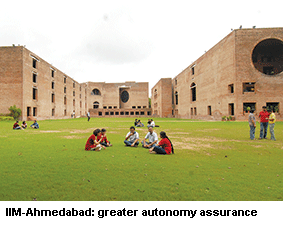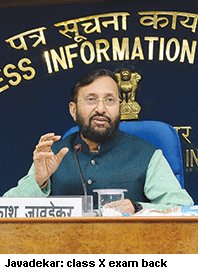 The indian institute of Management (IIM) Bill, 2015, which created a furore because it severely circumscribed the autonomy of the country’s 20 IIMs (see EW cover story August 2015 on www.educationworld.in archives) and was subsequently cold storaged, is being readied in a new variant and will be presented to the Union cabinet shortly.
The indian institute of Management (IIM) Bill, 2015, which created a furore because it severely circumscribed the autonomy of the country’s 20 IIMs (see EW cover story August 2015 on www.educationworld.in archives) and was subsequently cold storaged, is being readied in a new variant and will be presented to the Union cabinet shortly.
The new Bill has reportedly been reworked after dropping several controversial clauses and is being vetted by the law ministry before it is presented to the Union cabinet prior to being tabled in the winter session of Parliament. Chairing his first IIM Coordination Committee meeting at IIM-Shillong on September 20, Union human resource development (HRD) minister Prakash Javadekar assured IIM directors that the new Bill, which will give them greater autonomy, will soon receive cabinet approval.
Although they are highly ranked and acclaimed globally for producing corporate and business leaders for Indian and foreign companies, the IIMs, whose number has risen to 20 after a new IIM-Jammu was announced on October 13, don’t have statutory power to confer degrees or Ph Ds. Instead, they award institutional diplomas and fellowships to their graduates. Primarily to invest them with degree granting power, former HRD minister Smriti Irani drafted the IIM Bill, 2015. However, when the draft Bill was made public, it generated a national outcry because it severely abridged the autonomy of the IIMs, including the globally respected ABC (Ahmedabad, Bangalore and Calcutta) institutes, whose graduates are snapped up by the world’s top-rated corporates.
For instance, the Bill proposed that of the 15 members of each institute’s board of governors, the Union government would nominate seven, directly or indirectly. Moreover, the chairperson would be appointed by the HRD ministry as would the directors of all IIMs. Indeed under Irani’s Bill, all decisions taken by the board of governors relating to the appointment of committee chairpersons and faculty members, prescribing tuition fees and faculty remuneration and introducing curriculum changes would require the HRD ministry’s approval.
Understandably, the bull-in-a-china shop provisions of the IIM Bill, 2015, which was cold storaged by the Narendra Modi-led BJP/NDA government following national outrage, was a major factor in Irani’s ouster from the HRD ministry in July this year. Subsequently, since Javadekar took charge of the HRD ministry four months ago, the Bill has been reworked to inter alia completely abolish the office of Visitor (President of India) of the IIMs, and also reduce the number of government nominated members on their board of governors.
“If what we hear about the new IIM Bill is true, it will be a positive step of the BJP/NDA government. The earlier Bill was strange because it advised gurus how to run gurukuls. Government should repose trust in institutional managements, particularly the IIMs which have won themselves global reputations. If government is serious about improving business management education in India, it should close down the new IIMs it has created and build an ecosystem as in the US where both public and private institutions flourish,” advises Dr. Kamaljit Singh Anand, director of the Institute of Management Studies, Noida (estb. 1998) and a distinguished IIM-Ahmedabad fellow.
But that is asking too much of the BJP, which with its absolute majority in the Lok Sabha, is beginning to enjoy the power and perquisites of control-and-command governance.
Autar Nehru (Delhi)
Cherry picking reforms
Under the stern glare of the Rashtriya Swayamsevak Sangh (RSS), its ideological guardian and mentor, the BJP-led NDA government at the Centre is unlikely to incorporate the comprehensive, sensible and overdue recommendations of the T.S.R. Subramanian Committee Report into its New Education Policy 2016 (see cover story). However, it’s likely to cherry pick some of the committee’s recommendations on which there’s national consensus.
This was made plain by Union human resource development (HRD) minister Prakash Javadekar, former minister of state for environment, forest and climate change, who replaced the controversial Smriti Irani in Shastri Bhavan (HQ of the HRD ministry) following a minor cabinet reshuffle by prime minister Narendra Modi on July 5. Addressing a press conference after a meeting of CABE (Central Advisory Board of Education) in Delhi on October 25, Javadekar announced that the BJP/NDA government will amend s.16 of the Right of Children to Free and Compulsory Education Act (aka RTE Act), 2009, which mandates no detention of children in elementary education (classes I-VIII), and reintroduce upper primary (class VIII) if not primary (class V), exams and detain children who fail them.
“The quality of education and learning outcomes in schools are deteriorating. It was agreed (by CABE) that the Central government should amend the RTE Act and give states freedom to review the no-detention policy. Therefore, the RTE Act will be amended to allow states to either retain the no-detention policy or scrap it,” said Javadekar, adding that only a few state governments — Tamil Nadu, Telangana, Maharashtra, Karnataka and Andhra Pradesh — were in favour of retaining the no-detention provision of the Act.
In its report submitted to the HRD ministry on May 28, the Subramanian Committee Report (SCR) says: “At the upper primary stage, from class V-VIII for children between the ages of 11-14, the committee recommends that the system of detention of children who are below the requisite standard, should be reinstated. This will require a suitable amendment of s.30 (1) of the RTE Act.” Instead of accepting this sensible recommendation of the Subramanian Committee for the good of the country, the minister has ill-advisedly passed the buck on to state governments which have deeply politicised — and ruined — primary-secondary education.
At his October 25 press conference, Javadekar also made it clear that CABE and the HRD ministry are in favour of making the class X board exam compulsory for all students. The class X exam was made optional and replaced with the Continuous and Comprehensive Evaluation (CCE) system by a circular dated September 20, 2009 issued by Kapil Sibal, former HRD minister in the Congress-led UPA-II government, “to reduce examination stress” with students allowed to write their school’s — rather than board — class X exams.
Unsurprisingly, the circular was promptly implemented by CBSE (Central Board of Secondary Education) — the country’s largest pan-India school-leaving exams board (17,500 affiliated schools) — which is administered by the Union HRD ministry. However, the Council for the Indian School Certificate Examinations (CISCE) — India’s most admired board (see EW, June 2016 cover story) — and several state exam boards ignored it.
This back-and-forth tinkering with the examination system doesn’t impress experienced educationists. “Making examinations compulsory or optional won’t make much of a difference. The government needs to seriously invest in the education and professional development of teachers, improve teacher-pupil ratios and in-classroom teacher support. That’s the way forward,” says Poonam Batra, professor of education at Delhi University’s Central Institute of Education and member of the 2011 Supreme Court-appointed Justice J.S. Verma Commission constituted to probe teacher education countrywide.
Quite obviously the intent of the 29-month-old BJP/NDA government at the Centre which has rejected the main recommendation of the Subramanian Committee — to raise the annual outlay (Centre plus states) on education to 6 percent of GDP (see cover story) — is to pass the education reform buck to the states and cherry pick SCR recommendations which suit its ideological predilections. Restoration of the class X exam and introduction of a class VIII exam in BJP-ruled states are the first of them.
Swati Roy (Delhi)